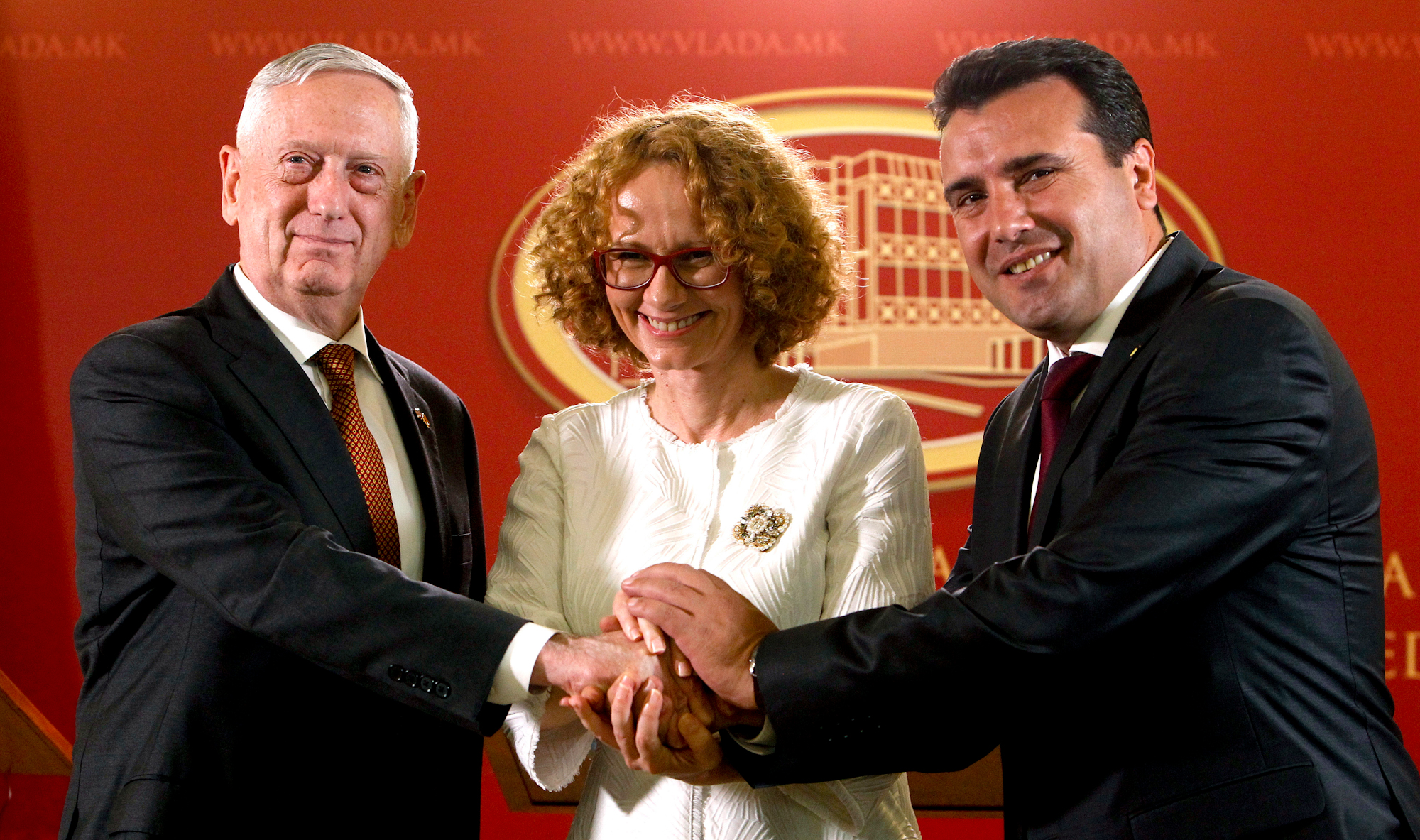ATHENS, GREECE — If a referendum is held and nobody is around to vote in it, is it really a referendum? That’s the question that could be posed with regards to the referendum held Sunday in the “Former Yugoslav Republic of Macedonia” (FYROM). Voters were asked whether they wished to ratify an agreement between the country’s prime minister, Zoran Zaev, and the prime minister of Greece, Alexis Tsipras, in which FYROM would officially be recognized as “North Macedonia” and Greece’s veto preventing FYROM’s application to join NATO and the European Union would be lifted.
While this issue is often minimized as yet another Balkan spat over trivial matters such as a name, what should be clear is that many of the world’s powers, such as the United States, the European Union, NATO, and Russia consider this matter far from inconsequential. This is evidenced from their consistent meddling in the Macedonia name dispute and the pressure they have openly exerted towards the governments and citizens of both countries.
In theory, this deal — known as the “Prespa Agreement,” as it was signed in the Lake Prespa region on the border between the two countries — puts an end to the decades-old dispute over FYROM’s self-identification using the name “Macedonia.” Following the collapse of the former Yugoslavia, Greece’s northern neighbor declared its independence as the “Republic of Macedonia” and has been, up until now, recognized as such by over 100 countries — including the United States, Russia, and China.
Not everyone has recognized “Macedonia” as such, however – and in Greece this has been a point of contention for decades. Opposition in Greece to its neighbor calling itself “Macedonia” stems from several factors: cultural, historical, and geopolitical.
Many Greeks — and many scholars — have argued that the population of today’s “Macedonia” bears no historical or cultural relation to the people of Ancient Macedonia, who spoke the Greek language and participated in the Olympic Games, a privilege reserved for participants from Greek territories. Modern-day “Macedonia” has nevertheless attempted to co-opt this ancient history as its own, filling the country with statues of Ancient Macedonian figures and naming major landmarks, such as its international airport, after such figures as Alexander the Great. FYROM’s original post-independence flag featured the “Star of Vergina,” a symbol of ancient Macedonia; and its current flag also bears a resemblance to this symbol. In all, such claims are viewed as a co-optation of Greek history and culture.
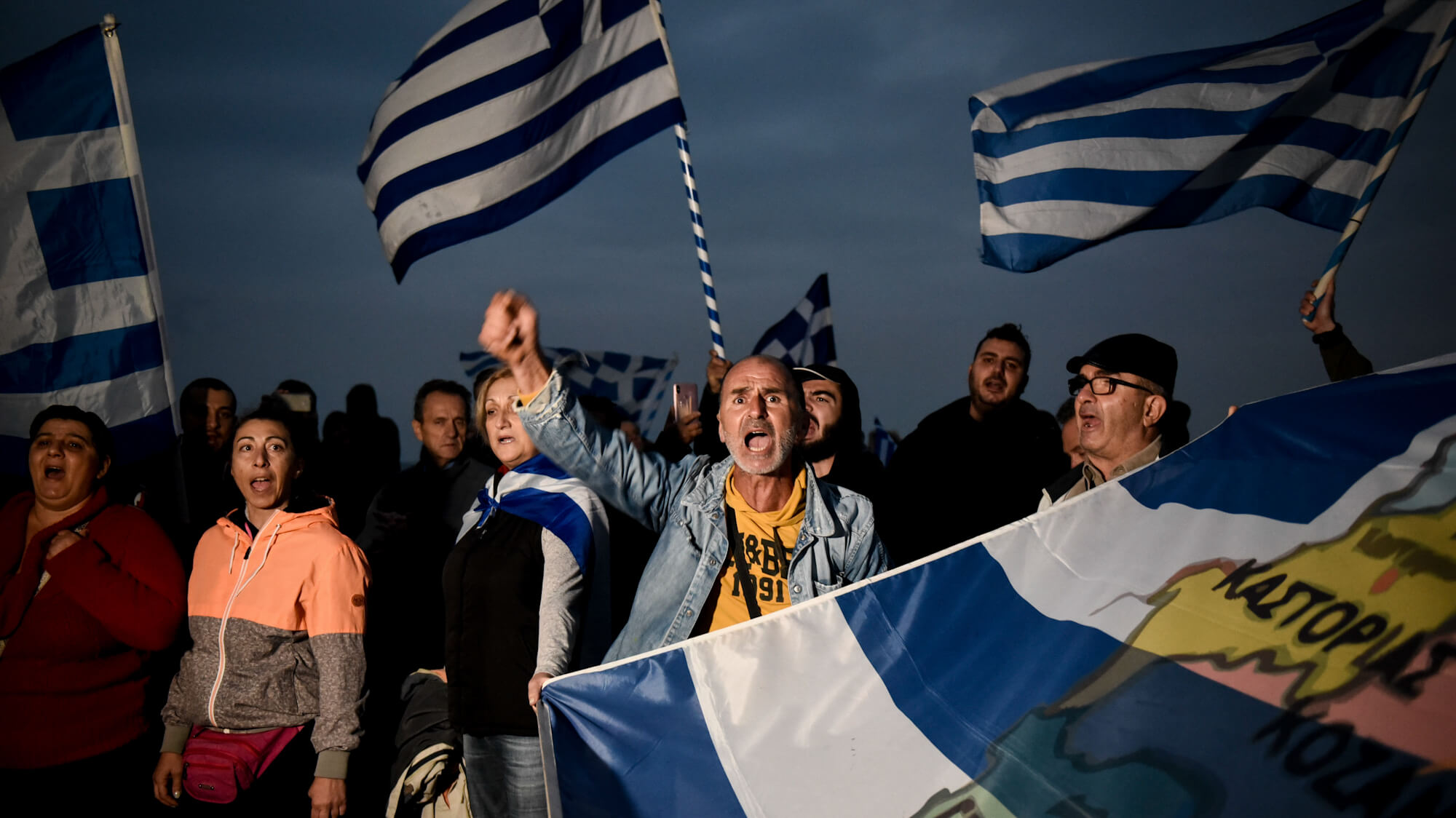
Greeks protest against Greece’s name deal with neighboring Macedonia, during a rally in Thessaloniki, Sept. 30, 2018. Giannis Papanikos | AP
Furthermore, there are many Greeks who fear that allowing its neighbor to call itself “Macedonia” opens the door to future geopolitical consequences and potential claims on Greek territory. Greece’s northern region is itself named Macedonia, and many politicians from FYROM have, in the past, made public appearances in front of maps of so-called “Greater Macedonia,” with territory extending well into modern-day Greece.
This dispute resulted in a diplomatic impasse. In 1994, the two countries agreed that the official name of “Macedonia” in the United Nations would be “Former Yugoslav Republic of Macedonia” (FYROM) and that this name would be used until a final agreement between the two countries was reached. Nevertheless, for most of the world, FYROM simply became known and recognized as “Macedonia” during this period. In 2008, FYROM’s bid to enter NATO was vetoed by the then-government of Greece, citing the still-unresolved naming dispute.
The situation remained more or less at a stalemate until early 2018 when, for some reason that remains unclear, talks between Greece and FYROM reignited in earnest and with a great sense of urgency.
The agreement
In June, soon after the deal was signed between Tsipras and Zaev, I analyzed each of its aspects, many of which went unreported in most of the mainstream media. What is clear is that while, at face value, the agreement seems to provide benefits to both parties, it in fact contains many details that could lead to future conflict.
The agreement, for instance, recognizes that the language of the country to be named “North Macedonia” is “Macedonian” – with the caveat that it is a language of Slavic origin with no relation to the Greek language. The citizens of this country will be “Macedonian/citizen of the Republic of North Macedonia,” while the text of the agreement references that the people of this country are unrelated to the people of the Ancient Greek civilization of Macedonia. It is, of course, absurd to think that citizens of this country will mention this “asterisk” when asked about their ethnicity.
The “North Macedonia” name will be acceptable for all uses and purposes, both domestic and international. “North Macedonia” will be required to change all domestic references of the name of the country to this new name, with international documents to be changed within a period of five years, but domestic political documents to be changed within five years of each relevant step in the EU ascension process (which itself might drag on for a very long time). If for instance, we have a situation such as that of Turkey, where ascension talks have stalled for decades on end, FYROM will, in effect, have the right to continue referring to itself simply as “Macedonia” indefinitely.
Most significantly, this deal, if fully ratified, will also unblock “North Macedonia’s” NATO and EU candidacy, which up until now has not proceeded as a result of the unresolved name dispute. The question posed to voters in FYROM in Sunday’s referendum pertained, first and foremost, to the country’s EU and NATO candidacy.
The real devil, however, is in the details. A close reading of the full text of the agreement reveals many aspects of the agreement that contradict historical realities and may pose potential hazards for Greece in the future.
One such aspect relates to the so-called “Macedonian” language. The terms of the agreement state that such a language was recognized by the Third UN Conference on the Standardization of Geographical Names, held in Athens in 1977. However, these claims do not correspond to reality. As explained by Georgios Babiniotis, professor of linguistics at the University of Athens, the 1977 Conference had a sole purpose: the establishment of a system for the transliteration and “romanization” of geographical names of non-Latin-based language systems (such as Greek or Cyrillic), while only one representative of the then-Yugoslavia, representing all six of its republics, was in attendance.
Indeed, the technical papers of this conference reveal a sole reference to “Macedonian” within the report submitted by the then-Yugoslavia, naming it as one of the “variants” of the language spoken in Yugoslav territory, further adding a reference to a “Macedonian Cyrillic” alphabet. These references are made only in the technical report submitted by Yugoslavia, while no other country, including Greece, made any reference to the recognition of a “Macedonian” language. Yet, in 2018, it is the Greek government that claims that such a language was recognized in 1977. One, therefore, must wonder, if the “Macedonian” language was already recognized, why must it be recognized once more? Is it perhaps because the “Macedonian” language, in fact, was not recognized in 1977?
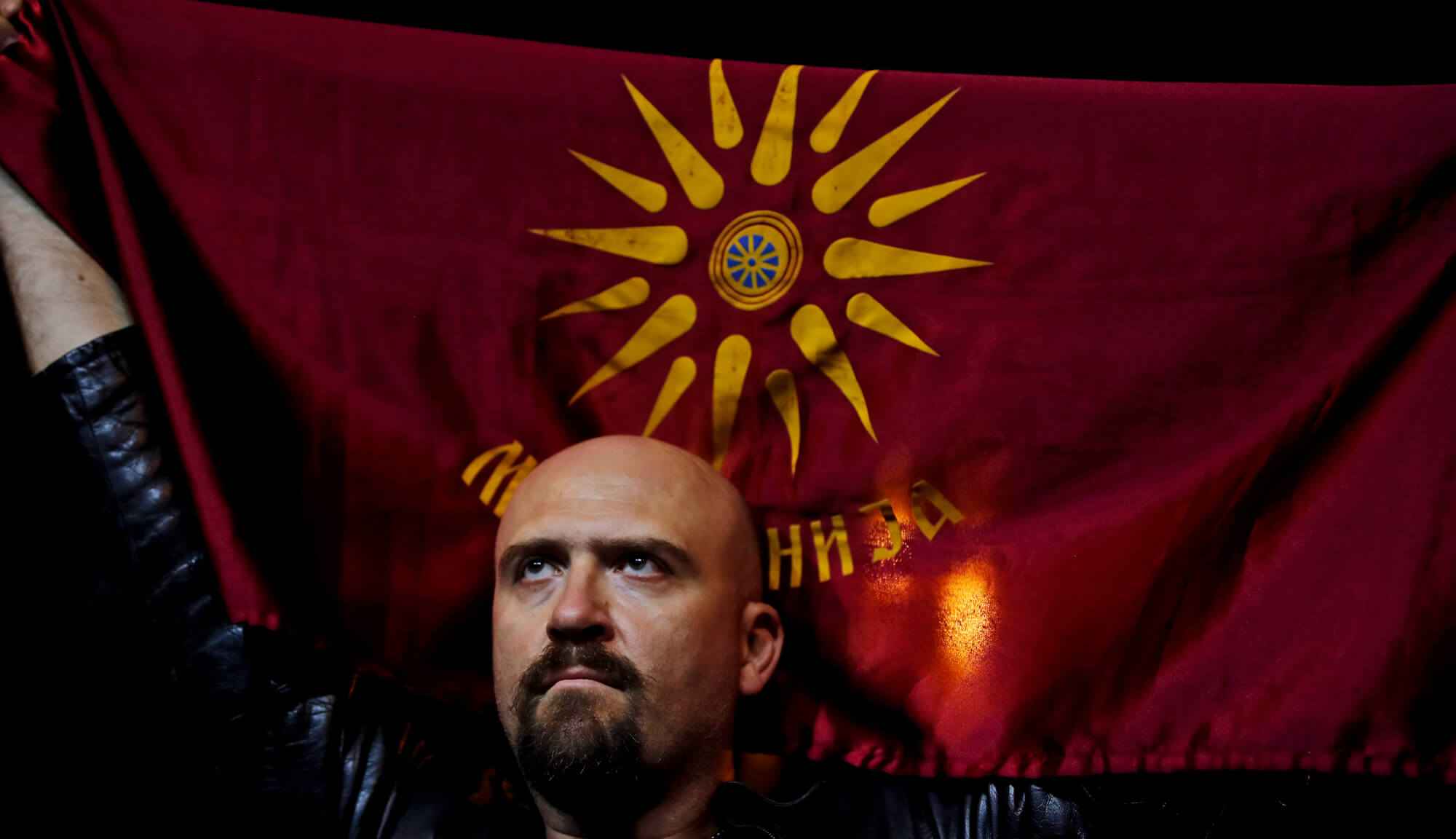
A referendum boycotter holds an old Republic of Macedonia flag during a rally in Skopje. Greeks consider the Vergina Sun, a Greek symbol. Thanassis Stavrakis | AP
Even more significantly, a “Macedonian ethnicity” within “North Macedonia” is now recognized by Greece. This likely opens the door towards the de facto (and eventually, official) recognition of a “Macedonian minority” within Greece. Denial of the existence of such a “minority” would then presumably violate Article 6 of the agreement, which prohibits “chauvinism” and “hostility” against the other party.
If there is a “Macedonian ethnicity” that purportedly exists within Greece as a “Macedonian minority,” what would stop such a “minority” or its compatriots in “North Macedonia” from eventually seeking “reunification” of the “two Macedonias” – that is, of “North Macedonia” with the northern Greek region of Macedonia? The agreement claims to recognize the territorial integrity of the two countries and prohibits each country from making irredentist claims upon the other. But are we to expect that the most virulently nationalist forces in present-day FYROM will abide by this agreement to the letter, when, until recently, prominent politicians of FYROM have been photographed in front of photos of “Greater Macedonia”?
These fears are not unfounded. The agreement makes no specific reference to protecting the name or status of the Greek region of Macedonia, nor the right of Greek Macedonians to refer to themselves as Macedonians. Instead, vague reference is made to the “area and people of the northern region” of Greece. Could identifying as a (Greek) “Macedonian” be construed as “chauvinistic” or “hostile”?
Indeed, as per this agreement, there are two different understandings of “Macedonia” and “Macedonian” historical context and cultural heritage: that of Ancient Macedonia and that of the present-day “Macedonian” language and ethnicity and the country to be named “North Macedonia.” While the agreement prohibits “North Macedonia” from making any claims towards the historical inheritance of Ancient Greece, who gets to define what is — and what isn’t — part of this cultural and historical heritage?
Illustrating this point, consider that vehement “Macedonian” nationalists — as well as some scholars — have made the argument that the Ancient Macedonian civilization was not Greek but something separate and distinct. The logical conclusion of such an argument is that any depictions and appropriations of, say, Alexander the Great or other symbols of Ancient Macedonian culture, history, and heritage by “North Macedonia” are not in violation of this agreement, as “Ancient Macedonia” is distinct from ancient Hellenic civilization. Indeed, the agreement foresees that if either party is using one or more symbols constituting part of the historical or cultural patrimony of the other party, the other party will be obliged to take “appropriate corrective action” to “address the issue.” Such an argument could be used against Greece if North Macedonia claims Ancient Macedonian heritage as distinct and as its own.
The deal also stipulates that FYROM will no longer use again “in any way and in all its forms” the symbol formerly displayed on its national flag (the ancient Greek “Star of Vergina”). As mentioned earlier, the current flag of FYROM contains a variation of this symbol, but nevertheless that country’s government spokesman has said that “state symbols have never been part of the negotiations” and that “the anthem, flag, and coat of arms remain the same.” So which is it?
Another committee foreseen by this agreement pertains to school textbooks. This committee will be supervised by the Ministries of Foreign Affairs (and not the Ministries of Education) of each respective country, and will “review” school textbooks and other aspects of each country’s educational curriculum, to eliminate any “irredentist/revisionist references.” However, who gets to decide what is “irredentist/revisionist”?
Here it is important to note that Matthew Nimetz, the “impartial mediator” initially installed by the Clinton Administration in 1994 and who, since 1998, has served in this role under the auspices of the United Nations, is the founding chair and director of the “Centre for Democracy and Reconciliation in Southern Europe” (CDRSEE). This organization, based in Thessaloniki, the capital of the Greek region of Macedonia, receives funding from such sources as the George Soros-founded Central European University, the State Department, the National Endowment for Democracy, USAID, the European Commission, the Foreign Office of the United Kingdom, the German Ministry of Foreign Affairs, the United Nations Development Program, the Greek Ministry of Foreign Affairs (of course), and a veritable who’s who of neoliberal institutions. It is involved with an initiative known as the “Joint History Project.”

Bill and Hillary Clinton and daughter Chelsea , speak with NATO commander Gen. Mike Jackson during a 1999 visit to Skopje, Macedonia. Boris Grdanoski | AP
The “Joint History Project” is described as an effort to “change the way history is taught in schools in the Balkans.” The CDRSEE produces school textbooks that are in use in schools in several Balkan countries, and one such textbook contains references to the “historic roots of the Macedonian nation,” while in place of the country’s national anthem a nationalistic poem regarding the “Macedonian nation” is published.
The above, of course, calls into question the impartiality of Nimetz in his role as “mediator” between the two parties: a potential conflict of interest exists if Nimetz’ CDRSEE stands to benefit from the publication of “revised” history textbooks, which the two countries might be obliged to publish per this agreement.
Returning our attention to the agreement, it evidently also creates a de facto open border between Greece and “North Macedonia.” Article 14, Paragraph 3 clearly states that there shall be no impediment to the movement of people or goods through the territory of either party to the territory of the other. This, translated, means free migration and free trade, even prior to “North Macedonia’s” EU membership.
Finally, the very next paragraph of the agreement goes further, stating the agreement of the two countries to construct, maintain, and utilize interconnecting oil and gas pipelines. Indeed, the agreement takes care to specify that this may refer to “existing, under construction and projected” pipeline projects.
The referendum
The agreement also set forth a roadmap with several steps that must be completed in order for the agreement to be fully ratified by both countries prior to officially coming into effect. Some of these steps have already been completed. On June 20, the parliament of FYROM voted, with a simple majority consisting of members of Zaev’s ruling coalition, in favor of the Prespa agreement. Following a veto by FYROM’s president (who stems from FYROM’s main opposition party, the VMRO-DPMNE, which opposes the deal), the agreement was accepted by the country’s parliament once more with a second simple majority on July 5.
This set the stage for the referendum held this past Sunday. This referendum served as a true test of the popularity of the agreement within FYROM. And it is here where the referendum — and the agreement — have failed spectacularly.
At face value, of course, the referendum did not fail. Over 90 percent of those who voted favored the Tsipras-Zaev pact. But who voted? Only 36 percent of eligible voters cast a ballot, falling well short of the required 50 percent participation needed in order to make the referendum binding. Indeed, FYROM’s electoral commission has officially invalidated the referendum result.
This result is largely considered a slap in the face for both Zaev and Tsipras — and for the long list of foreign political actors who championed this agreement. Here, the reasons why voters in FYROM opposed the agreement and abstained from recognizing and participating in the referendum should be outlined. For “nationalist Macedonians,” the deal is tantamount to treason, as the “North Macedonia” name represents a retreat from their position that they are “true Macedonians.” For many in FYROM, the Zaev government also lacks legitimacy, as Zaev’s party finished second in parliamentary elections in December 2016 and was essentially installed to power at the behest of the U.S. State Department in January 2017 after the first-place VMRO-DPMNE failed to form a majority coalition. Finally, there are also many within FYROM who oppose the country’s ascension to NATO and the EU.
Together, these factors may help explain why a significant percentage of those who voted in the referendum — at least 260,000 such voters — were Albanian, and therefore ethnically not “Macedonian.” This begs the question: what’s in it for them?
Indeed, the referendum question positioned the issue as one that was a choice between acceptance or rejection of EU and NATO membership. Specifically, the question posed to voters read as follows: “Are you in favor of European Union and NATO membership by accepting the agreement between the Republic of Macedonia and the Republic of Greece?” Pro-EU billboards sprouted up throughout FYROM leading up to the referendum, such as this billboard, which read: “The EU helps Macedonia with 260,000 euros a day. Together for a European Macedonia.”
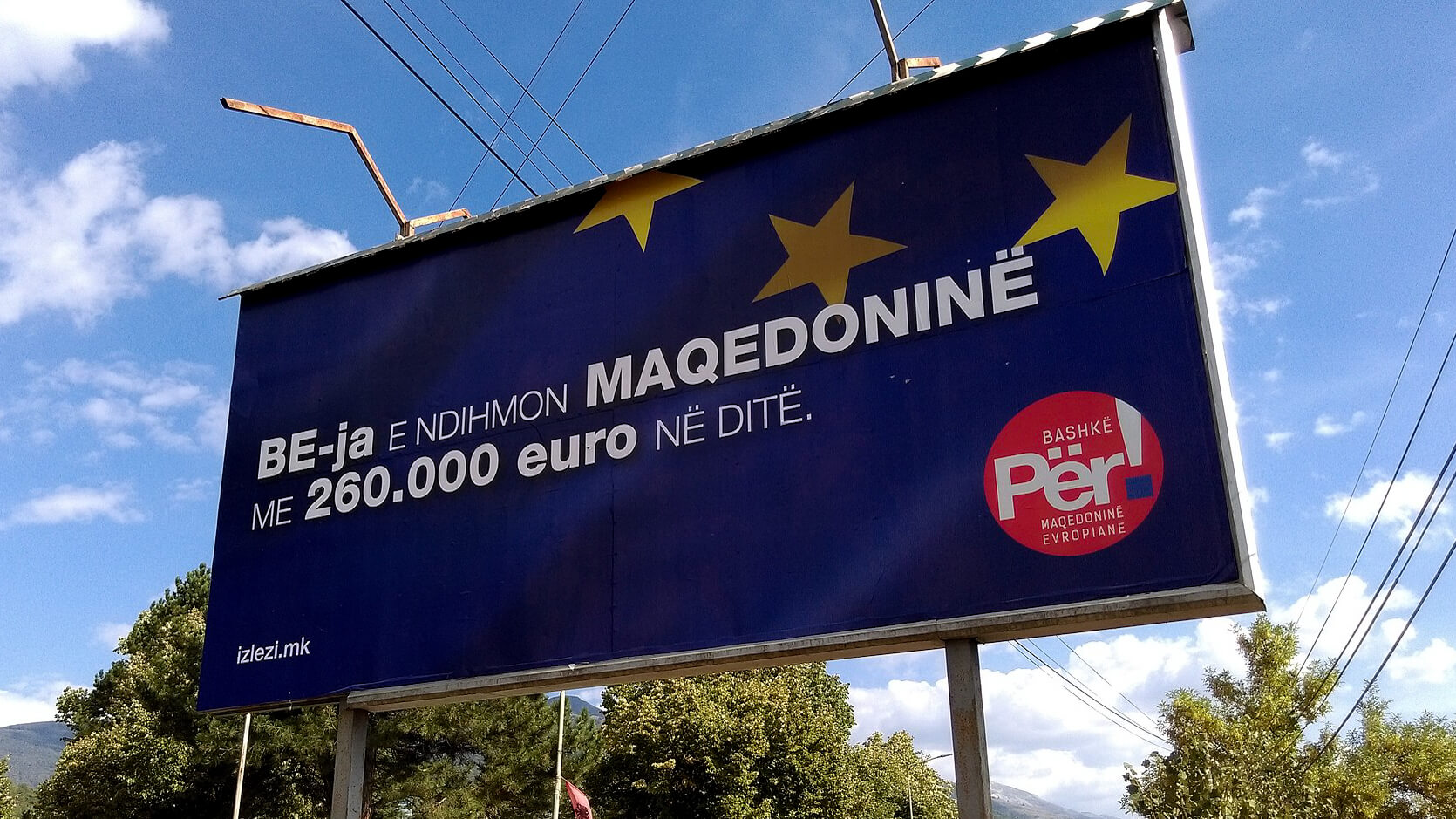
A pro-Macedonian referendum billboard written in Albanian reads: The EU helps Macedonia with 260,000 euros a day. Together for a European Macedonia. Resnjari | Creative Commons
This should help explain why much of the global political establishment — and its subservient press corps — have so fanatically supported this agreement while accusing any opposition to it as being a product of so-called “Russian meddling” (sound familiar?).
While in reality less than one-third of eligible voters cast a ballot in favor of “yes,” this has not stopped Zaev or the foreign press from triumphantly declaring the referendum a success. U.S. News & World Report initially cited a “low turnout” but “big support” for “yes,” later amending its headline to quote a Zaev statement claiming that the vote “shows the will of the people.”
The New York Times, in turn, stated that “both sides claim victory” in the aftermath of the referendum. While this isn’t incorrect per se, as those in favor of abstention also took to the streets in celebration, compare this headline to the Times’ headline in 2016 following Hungary’s referendum on accepting more migrants: “Hungary Votes Against Migrants, but Too Few to Clear Threshold.” The low turnout there was clearly spelled out, but the difference is that the Times agrees with the face value result of one referendum (that of FYROM) but disagrees with the other (Hungary’s).
The Wall Street Journal, in turn, praised the “moderate” Tsipras and his stance in favour of the “North Macedonia” deal. Marcus Walker, co-writer of this piece, could previously barely contain his glee over the signing of this agreement, as seen on his Twitter feed.
“North Macedonia.” Can we move on now please?
— Marcus Walker (@MMQWalker) June 12, 2018
In turn, the Twitter account of U.S. Ambassador to Greece Geoffrey Pyatt, who was the United States’ ambassador to Ukraine in 2014 during the coup and subsequent installation of a far-right government in that country, provides some insights into how he and the State Department view the deal. Here we see tweets by State Department spokeswoman Heather Nauert welcoming the referendum results and expressing strong support for the “full implementation” of the agreement, and by NATO Secretary General Jens Stoltenberg welcoming “the yes vote” in the referendum. Pyatt was also sure to retweet journalists from subservient, pro-government Greek public broadcaster ERT, the Greek government-owned AMNA news agency, and Greece’s neoliberal media outlets of record (the Kathimerini newspaper and Skai TV) in favour of the referendum result.
The U.S. welcomes the results of the Republic of #Macedonia’s Sept 30 referendum. We strongly support the Agreement’s full implementation, allowing Macedonia to take its place in @NATO and the EU, contributing to regional stability, security, & prosperity. https://t.co/FaBKpi7JaF pic.twitter.com/N9Ik6FyosI
— Heather Nauert (@statedeptspox) September 30, 2018
I welcome the yes vote in
referendum. I urge all political leaders & parties to engage constructively & responsibly to seize this historic opportunity. #NATO’s door is open, but all national procedures have to be completed.
— Jens Stoltenberg (@jensstoltenberg) September 30, 2018
The unabashed support of NATO and the State Department in favor of the deal makes it all the more ironic that “social democrat” Zaev and “radical leftist” Tsipras are so strongly in favor of the agreement — especially with Tsipras and his party, SYRIZA, stemming from a “radical” and purportedly “anti-American” political background. It’s ironic to see many in the Greek and global left also supporting this deal, which mirrors NATO, EU, and State Department objectives in the Balkans and essentially legitimizes the longstanding claims of nationalist Macedonians (even if said nationalists largely believe this agreement provides too many “concessions” to Greece).
Indeed, German Chancellor Angela Merkel was recently in FYROM to provide support for the referendum and to urge the country’s voters to choose “yes.” This may dredge up memories of Nazi Germany’s support of the formation of an “Independent Macedonia” as far back as 1944. UN Secretary-General Antonio Guterres urged FYROM to “proceed with implementation” of the agreement. And via the Atlantic Council, we learn that former President George W. Bush has emerged from the mothballs to lend his support to the deal, in an open letter to the people of FYROM.
As this foreign meddling in FYROM’s affairs has taken place, the same actors have accused Russia (who else?) of “meddling” in FYROM’s affairs. The Greek government, in June, expelled two Russian diplomats for, among other purported transgressions, allegedly fueling widespread protests against a deal regarding the Macedonia name. Recently, The New York Times warned us that the Russians were engaged in a “disinformation” battle in FYROM. U.S. defense secretary Jim Mattis, in turn, “scolded” Russia over its efforts to “influence” the referendum result. And The Washington Post informed us that FYROM is a “tiny country” with a “big Russia problem.”
It is, of course, ironic to hear talk of FYROM’s “big Russia problem” when the largest U.S. Embassy in Southern Europe — if not the world — is based in Skopje, capital of FYROM, while FYROM has one of the highest densities of U.S. diplomats in the world. It also makes commonly-heard arguments that “tiny” FYROM is “no threat to Greece” absurd at best, especially when the country’s “small” military is also supported and trained by Turkey.
Further demonstrating the establishment’s support of the two leaders and the “North Macedonia” deal, there have been calls for Tsipras, as well as Zaev, to be awarded the Nobel Prize — perhaps fitting when considering that the likes of Barack Obama and Henry Kissinger are amongst its past recipients. One such proposal came from Foreign Policy magazine, whose CEO, David Rothkopf, is a board member of the IREX non-governmental organization. IREX is listed as a donor of the aforementioned CDRSEE, where Macedonia “mediator” Matthew Nimetz is a founding member, former director, and current board member. More recently, it has been reported that Tsipras and Zaev are considered “favorites” for the prize.
The aftermath
Nobel Prize or not, what is evident is that the referendum result in FYROM was not optimal for the establishment powers-that-be. But — as with the Greek referendum rejecting austerity that the Tsipras government was all too eager to ignore, and with the hysterical (and, in part, Soros-funded) efforts to overturn Brexit — the stated will of the people is simply ignored whenever convenient. This may be the case with the “North Macedonia” referendum as well, as Zaev has already said that he will “press on” with the name change, stating his determination to “take Macedonia into the European Union and NATO,” while adding that a “vast majority” of his citizens supported the deal. In being so remarkably tone-deaf towards his voters and so subservient towards the EU and Washington, is Zaev itching to become the next Tsipras?
This subservience, of course, follows “nationalist” pronouncements by Zaev leading up to the referendum, in which he triumphantly declared that “we are Macedonians” (with no geographic qualifier) and that “our language and culture” are recognized the world over. Such language, which would seem to run afoul of the agreement, instead of being condemned by the SYRIZA-led “radical leftist” government in Greece, is tacitly supported, judging by the unabashed support lent to the deal by the Greek government and its statements following the referendum.
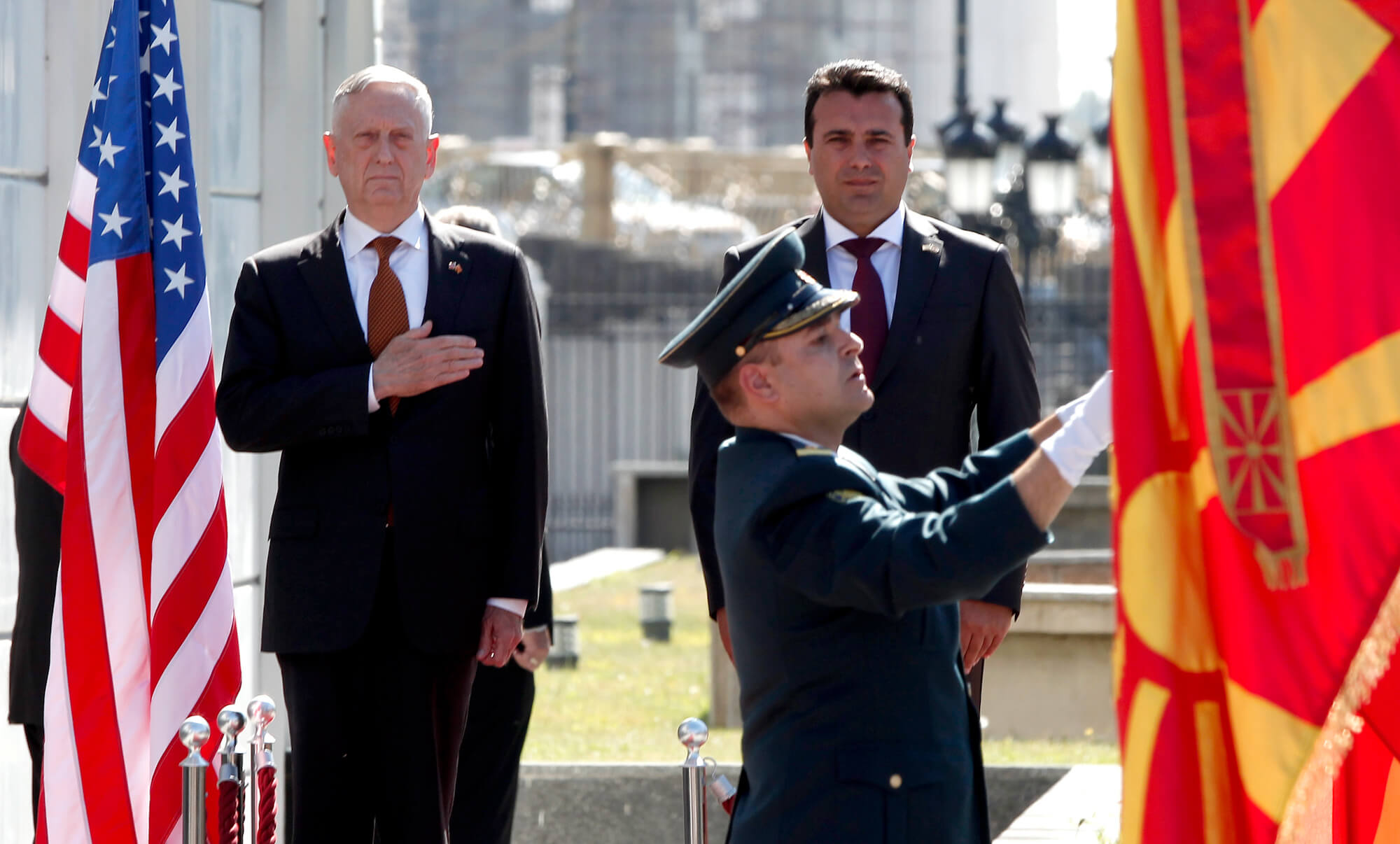
U.S. Defense Secretary James Mattis, left, and Macedonian Prime Minister Zoran Zaev, top right, observe the national anthems during a welcome ceremony at the government building in Skopje, Macedonia, Sept. 17, 2018. Mattis was in Macedonia to condemn alleged Russian efforts to use to build opposition to an a vote that could pave the way for the country to join NATO. Boris Grdanoski | AP
The Greek foreign ministry — which funds Nimetz’ NGO — blamed the low turnout in the referendum on “daily fake news” and “a climate of nationalism.” And SYRIZA member of parliament and former government minister Giannis Balafas, in a televised appearance, was visibly angered when Greece’s northern neighbor was referred to as “Skopje” (as it is commonly called in Greece, after the name of its capital) instead of “Macedonia” (with no geographic qualifier to boot), accusing those who do this of being “nationalist.”
Despite such unabashed obliviousness though, the future of the Tsipras-Zaev agreement is far from certain. In FYROM, a parliamentary vote for the constitutional amendments that must be ratified as per the deal will follow. A two-thirds majority in parliament, which Zaev’s ruling coalition does not have, is required to pass these amendments. Failure would likely lead to snap elections and the collapse of the Zaev government.
But even if this hurdle is overcome, the agreement must also be ratified by the Greek parliament — with SYRIZA’s governing partner, the Independent Greeks, and the main opposition party, New Democracy, stating their opposition to the agreement; and with occasional pressures from the EU to pass the deal with a supermajority of 180 votes instead of a simple majority of 151 votes, lending the agreement greater legitimacy.
In complete contradiction to the will of the vast majority of Greeks, the SYRIZA-led government is pressing forward with its own support of the Prespa agreement, perhaps even more fanatically so than its counterparts in FYROM. Government spokesman Dimitris Tzanakopoulos stressed the need to “preserve the Prespa agreement,” while the government also stated that it will not hold early elections until after the Prespa agreement has been ratified in the Greek Parliament.
But even if the deal clears the parliaments of both Greece and FYROM, one final roadblock may remain: the United Nations, where Russia recently hinted that it may veto the deal. Oh no, not more of that “Russian meddling”!
Will NATO, the European Union, the State Department, and the neoliberal class led by the likes of Angela Merkel get their way? One thing is clear: the referendum result was yet another slap in the face towards this establishment, one of several in the past two years. It is a particularly big slap in the face for Nimetz, who spent 25 years attempting to impose the NATO-neoliberal-globalist line on the Macedonia name dispute, only to see the referendum on the deal he helped broker collapse under its own weight. Now, either the deal will collapse, or it will be rammed through in FYROM without democratic pretense. Here, it bears noting that no such pretense was afforded to Greece in the first place, where at SYRIZA’s insistence a referendum will not be held.
It is also ironic that the very deal that would “solve” the ongoing dispute may fail as a very result of the invented Macedonian “nationalism” the backers of the agreement, such as Nimetz, helped foster over a period of 25 years.
Top Photo | U.S. Defense Secretary James Mattis, left, Macedonian Prime Minister Zoran Zaev, right and Macedonian Defense Minister Radmila Sekerinska, center, shake hands while posing for the media in Skopje, Sept. 17, 2018. Mattis was in Macedonia to condemn alleged Russian efforts to use to build opposition to an a vote that could pave the way for the country to join NATO. Boris Grdanoski | AP
Dr. Michael Nevradakis is an independent journalist presently based in Athens, Greece. Michael is the host of Dialogos Radio, a weekly radio program featuring interviews and coverage of current events in Greece, and is a member of the communication faculty at Deree – The American College of Greece. He was previously a Fulbright scholar and completed his Ph.D. in Media Studies from The University of Texas in 2018.
The post North Macedonia Referendum: No Shortage of Foreign Meddling but a Major Shortage of Voters appeared first on MintPress News.
